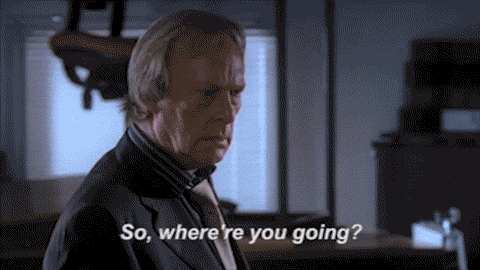When I was young, I loved Hollywood movies. Everyone did. The only thing that made me uncomfortable, was that the Russians were always the bad guys. They were greasy, grizzled, violent, barbaric drunkards, and they were always beaten by the main good guy in the end. Then Armageddon came on screen, and there was Lev Andropov. He was a good guy, and everyone was really excited about it.
Some people, though, complained that Lev was the same greasy, grizzled, violent drunken barbarian as all his predecessors. They could see no difference between him and those others; in fact some of the bad guys seemed better fleshed out and had more appeal than him. The answer was always: ‘But he is a good guy, doesn’t it suffice?’.
Now that I’m grown up, I often remember this situation when it comes to discussing representation. And I should say: ‘No, just making someone a good guy doesn’t suffice’. Being on the right side of the conflict doesn’t magically make the offensive side nonexistant. Doesn’t excuse poor writing and bad narrative choices. Poor Loras is one of the best (or, rather, the worst) examples of why this is so.
Representation vs Representativism
The idea behind the demand for representation is that if someone exists in society, they have a right to exist in that society’s culture. If there are people of color in high schools, there should be people of color in TV high school dramas; if there are women in science, there should be female scientists in movies, etc.
The idea behind the practice of representativism is that it’s easier to throw a bone to those weirdoes with their demand than to face backlash. Which in turn leads to the idea that a character who is part of representation is therefore a representative for a whole class of people and should somehow embody them all.
So, we get loads of one-dimentional cardboard characters who bathe in overused tropes and toxic stereotypes, but are unquestionably good. And don’t even think about making your female character an anti-hero! It would produce a scandal. Because she is a representative for all women of the world, and you therefore accuse them all of being anti-heroes!
It sounds absurd. It is absurd.
What is New Tricks?
New Tricks is a BBC police drama, broadcast from 2003 to 2015. It features three retired policemen and a blonde DSI Sandra Pullman working on cold cases. And it is a comedy. It’s a very tropey description, isn’t it? And the show plays with those tropes, subverting our genre expectations and giving new life to the old narrative techniques.
I would never say it was a superb show, or even a very very good one. It had its problems, inherent to the genre. Namely, the plot was sometimes less developed than it should have been, and the reveal was sometimes obvious right from the beginning. I’d even say it didn’t always stay true to its method of positively representing marginalized characters. This show fell victim to the temptation of making A Suffering Gay Who Died For His Orientation (i.e., Bury Your Gays) story at least once. Its use of Eastern Europeans was likewise very disappointing (basically, if the episode had a Russian/Ukrainian/you get it immigrant as a character, he would be the main villain).
But none the less, the show was good. It was a pleasure to watch, the narrative was mostly waterproof, and it battled representativism with vigor and emerged (almost) victorious, which is why it caught my attention.
And, of course, it had an excellent cast.
Not A Strong™ Woman

I can join the chorus of those who hate Strong™ female characters and complain that a woman protagonist is too often either flawlessly exceptional or useless. Sandra Pullman (Amanda Redman) is none of that. She is an average not very young woman with a natural body type, a DSI who solves hard cases, and yet she is a leading lady.
And what I loved about her is that she was not a Strong™ woman, though she certainly was a strong-willed person. She was bright, she was professional. Sometimes she was bitter, and sometimes she was chipper. She has been an optimist, a pessimist, and even a realist depending on situation. Basically, she was everything a male protagonist is permitted to be, and yet she was a woman.
A woman who doesn’t shy away from her femininity while also not showing it off. Being a professional, being (in later seasons) married to her work didn’t require making her masculine. Sandra wears fine clothes and accessories, flirts with handsome guys she encounters, deals with gender expectations. She likes other women (not in a romantic way, unfortunately). She empathizes with them to the point it may blind her.
Those two parts—being a good police detective and being a woman—don’t contradict each other. They coexist. The show never makes her choose between those two.
Dealing with Older Characters
As is natural for a show that deals with glorious exploits of retired policemen, it has a very diverse cast of older (middle aged-ish) characters. And the trait that unites them all is that they are human beings.
I mean, while the doctrine of representativism dictates that old age (or sexual orientation, or race, or anything) is one’s defining quality, this show kindly says: no, it is not. One’s defining quality may be his or her temper, morale, worldview, or upbringing, but not age. Age just brings some experience, or wisdom, or weariness… or it brings nothing but age itself.
On the other hand, the same doctrine dictates that older characters should not be actually unlike young people. This only seemingly contradicts the first statement; age defines them, but in name only. Because representativism is born from fear. This time, it is fear of the accusation of ageism.
I loved the episode centered on the retirement house, because they chose it as a stage for one of the best, most touching, and tragic love stories, and it didn’t sound unnatural. It was the society of elder people, who were frail in body and mind and extremely vulnerable. It was a society of elderly people, who were strong in their feelings as well as capable of great love and great hatred. In other words: a human society.
We had been allowed to see the depth of their souls first, that’s why we were then allowed to see those who used and abused those people. We had to get to know them first, so that we could have not generic ‘old frail victim’, but a fleshed out human being to empathize with. I’ve rarely seen that done so well.
How Humanizing Victims Destroys Toxic Myths
Talking about the elderly, I remember another episode where a con man preyed on elder ladies, pretending to care for them while taking priceless items from them as gifts. It’s a fairly typical story about naive women desperate for attention who let someone fool them because they’ve fooled themselves. And the con man is the one who is sympathetic, because he had to bear with the unbearable temper of ‘those old bitches’. The way this narrative is told it almost justifies his actions.
On New Tricks, we had a chance to see it from the other angle. Yes, the women are doddering; they’ve grown whimsical and emotionally unstable. Basically, they are not comfortable any more, and therefore they are left alone by their relatives. That’s why they are easy prey for the con man. It is not a clever man vs ‘old bitches’ who use him, but he prevails; it is a scoundrel who uses the most vulnerable, the most defenseless.
That’s what I liked the most about this show; it always told the victim’s story, not the criminal’s. And in doing so it persuaded the audience to empathize with the victim, to feel sorry for them.
Nowadays much is said about value of humanizing villains, which I definetly agree must be the thing. But humanizing victims is no less meaningful. And by humanizing I mean penning a victim as a fully human being, with personal story that has value, not as a random mcguffin that futhers or kickstarts the protagonist’s (or the villain’s) story.
When they provide us with whole lot of freudian excuses for the villain, but let his victim rot forgotten in the fridge, something wrong happens with our perception of the world, I think.
Mental Illness and Neurodivergence

Brian Lane, one of the three retired policemen, is both neurodivergent and mentally ill. First, he is an former alcohol addict who has to abstain completely to preserve his sobriety. Second, he is in the autistic spectrum. Third, he has bipolar affective disorder. None of these are as the tiniest bit romantic.
This is a sore problem for me, being in the spectrum myself. The representativism doctrine shies away from the real consequences of being neurodivergent or mentally ill. Perhaps because it fears to offend someone by realistic depiction of mentally ill or neurodivergent individuals. Those with autism, for example, are generally depicted as unworldly geniuses who are misunderstood by bigots who surround them. They’re savants, not people who not only can also struggle with mental illness and addiction like those not on the spectrum, but have a significantly greater chance to aquire either one.
Brian Lane was like a breath of fresh air for me, because he was realistic. His wife, though she loved him, left him several times because his illness went out of control and made him insufferable. He was not a supreme genius, he just had a mind for numbers and a keen memory for details. When he stopped taking his medicine, he became obsessed, and his obsession didn’t lead him in the right direction. On the contrary, it lead him to a deliriously unfounded, absurd theory.
On the other hand, his mental differences didn’t constitute his character. It was only one facet of it. Brian Lane was funny, a good friend, and loved his wife. He was extremely compassionate, clever, interesting, talkative. He had his secrets, too. Again, he was human.
There And Back Again
Interestingly, the show could be drastically different from what it became. When I decided to write about it, I managed to find the pilot episode. And it was like I watched a piece of other show. Sandra, who caught my eye right from the start, was reduced to the Meddling Blonde, bound to deliver only comic relief by her unstable personal life, sort-of anger issues, and inability to perform well without help of her Wise Males. Brian, who was as relatable to me as a person of the opposite sex and ~40 years older could ever be, was your typical misunderstood Autistic Genius. His very real issues were eschewed in favor of the pop culture image. (Yes, I know he was just a fictional person, but you see, they named his mental illness.)
Two other characters, Gerry and Jack, were not like themselves-in-season-three, as well. But what’s crucial, Sandra was not the protagonist in the story supposedly about her (Gerry was, and he was awful), nor was the story was about the victim. It was (yet again) about Gerry and a little bit about the two criminals.
The pilot was, basically, a very generic police drama with a touch of comedy. Comedy that was delivered by that Meddling Blonde and her relationship with the Retired Geniuses. But then—I don’t know when exactly, as I started watching from Season 3—those behind it understood something was wrong. And they changed it.
Sadly, after Season 8 the show started warping back to its original tropes. Sandra was sidelined again, Brian was gradually made into a pop culture autistic character, and somehow the stories became both more and more complicated and less and less interesting.
Conclusion
I decided to write about this show because it’s a very summer-y thing. It’s light-hearted, but awakens deep feelings and asks hard questions. It’s enjoyable, yet thought-provoking.
But more than that, it battles representativism with significant success. And it was not ‘born’ that way; it grew up to understanding the humanity of those it decided to represent. It was not ideal, but it showed me that the ideal is in fact quite reachable. If a very simple police drama can achieve so much in this aspect, so can other shows.
So, I wholeheartedly recommend you watch the show this summer. A summer when ‘Wonder Woman’ proved that not only little-known police dramas can walk against mainstream and battle the same old enemy: hypocrisy under the name of representativism.

